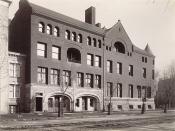Huxley's point of view in Brave New World is third person, omniscient (all-knowing). The narrator is not one of the characters and therefore has the ability to tell us what is going on within any of the characters' minds. This ability is particularly useful in showing us a cross section of this strange society of the future. We can be with the Director of Hatcheries and Conditioning in the Central London Conditioning and Hatchery Centre, with Lenina Crowne at the Westminster Abbey Cabaret, with Bernard Marx at the Fordson Community Singery. An extreem example of the technique would be in Chapter Three, when we hear a babble of unidentified voices--Lenina's, Fanny Crowne's, Mustapha Mond's--that at first sound chaotic but soon give us a vivid understanding of this brave new world.
The first three chapters present most of the important ideas or themes of the novel. The Director of Hatcheries and Conditioning explains that this Utopia breeds people to order, artificially fertilizing a mother's eggs to create babies that grow in bottles.
They are not born, but decanted. Everyone belongs to one of five classes, from the Alphas, the most intelligent, to the Epsilons, morons bred to do the dirty jobs that nobody else wants to do. The lower classes are multiplied by a budding process that can create up to 96 identical clones and produce over 15,000 brothers and sisters from a single ovary.
All the babies are conditioned, physically and chemically in the bottle, and psychologically after birth, to make them happy citizens of the society with both a liking and an aptitude for the work they will do. One psychological conditioning technique is hypnopaedia, or teaching people while they sleep--not teaching facts or analysis, but planting suggestions that will make people behave in certain ways. The Director...


